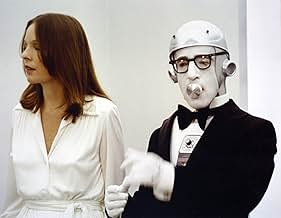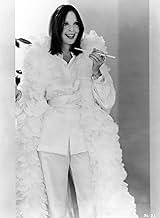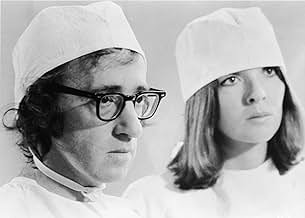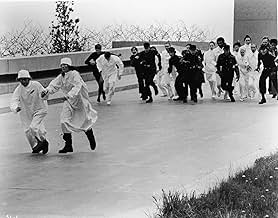IMDb-BEWERTUNG
7,1/10
45.778
IHRE BEWERTUNG
Ein nerdiger Geschäftsinhaber wird aus einem künstlichen Tiefschlaf wieder ins Leben zurückgeholt, um in einer zukünftigen Welt gegen die repressive Regierung zu kämpfen.Ein nerdiger Geschäftsinhaber wird aus einem künstlichen Tiefschlaf wieder ins Leben zurückgeholt, um in einer zukünftigen Welt gegen die repressive Regierung zu kämpfen.Ein nerdiger Geschäftsinhaber wird aus einem künstlichen Tiefschlaf wieder ins Leben zurückgeholt, um in einer zukünftigen Welt gegen die repressive Regierung zu kämpfen.
- Auszeichnungen
- 2 Gewinne & 2 Nominierungen insgesamt
Mews Small
- Dr. Nero
- (as Marya Small)
Stanley Ralph Ross
- Sears Swiggles
- (as Stanley Ross)
John Cannon
- Various Voice-Overs
- (Synchronisation)
- (Nicht genannt)
Myron Cohen
- Robot Tailor
- (Nicht genannt)
Empfohlene Bewertungen
Woody Allen's films are generally treasured among other comedies because of their wit and charm. Many critics would agree, though, that Allen's earlier films were among his best. One of those movies was a lighthearted film called `Sleeper,' which starred a younger version of Allen and a younger, but always beautiful Diane Keaton. Although `Sleeper' leaves a person in stitches from laughter, its one flaw is that it lacks an ending. But don't let that stop you from seeing this comedy classic. In the end, who cares where it goes because it's just flat out funny. `Sleeper' is the story of Miles Monroe (Allen), who is cryogenically frozen in 1973 after having a procedure in a hospital. He is awoken nearly 200 years later by a group of scientists who want Monroe to help them defeat the leader of their society, as America's future consists of a totalitarian state. While on his adventure through this futuristic world, Monroe meets a beautiful woman named Luna Schlosser (Keaton) who he begins to have a love interest in. The two team up to try to oust their tyrannical government and bring about freedom and prosperity. `Sleeper' was hysterical from beginning to end. The very opening scene shows Monroe covered in tin foil-clearly scientists in 1973 found new and amazing uses for this wonderful kitchen product. As soon as Monroe awakens, he is disoriented, smiling aimlessly into space and walking backwards and into people. Allen's comical blend of intellect and charm shows up soon after. The futuristic society is comprised of people who have no historical references for the events of the past 200 years, as their leader has undoubtedly outlawed certain forms of knowledge that could lead to rebellion. They use Monroe to fill in the historical gaps by showing him pictures of famous twentieth century individuals, such as Joseph Stalin. Monroe provides his own synopsis of their contributions to the world in his own clever way, as he does also for former President Nixon. Allen's writing, direction and performance were hilarious. Rarely do we see writing as clever and sidesplitting in today's comedies. The only other comic director today that could even compare to Allen would be Christopher Guest, whose mockumentary films such as `Best In Show,' and the recent `A Mighty Wind,' have a real source of comedy. Most present comedies are trivial, filled with rehashed jokes that depend more on toilet humor than any form of real wittiness. The film's only problem is that after an hour and a half, it doesn't seem to know what to do with itself. It ends on a clever note about love with the protagonists somehow managing to save themselves, but not really the day. They realize that perhaps the only thing worth fighting for, in the end is love. All in all, `Sleeper' was a very funny farce on science fiction stories, and it cemented Allen's ability to be an engaging and funny in his films. ***
No question that Woody Allen's earliest films were the most unpretentiously humorous, and Sleeper stands out among them. The conception of a frozen Allen waking up centuries in the future allows for plenty of biting satire on America in the 70's, not that we don't have plenty of good old-fashioned slapstick to boot. The bit with the Jewish robot tailors knocks me out no matter how many times I see it ("o-KAY, ve'll take it IN").
In this early comedy, Woody Allen plays Miles Monroe, a twentieth century healthfood restaurant owner and jazz clarinettist who is cryogenically frozen after surgery and awoken two centuries later. The America of 2173 is a totalitarian state ruled by an oppressive dictator, and Miles has been reanimated by a group of rebels fighting to overthrow the government. For reasons too complex to set out here, Miles is forced to go on the run disguised as a robot and finds himself falling in love with his new owner, an attractive but intellectually vacant young woman named Luna. The film recounts how Miles wins Luna over to the rebel cause and tells the story of their fight against the regime.
Unlike some of Woody's later films, this is a pure comedy. It does not try to explore philosophical issues or to analyse the human condition in the same way as, say, "Hannah and her Sisters" or "Crimes and Misdemeanours". Although I normally think of Woody as a master of verbal wit, much of the humour in "Sleeper" is physical slapstick, based upon (and no doubt deliberate homage to) the comedians of the silent era such as Charlie Chaplin or Buster Keaton. (I particularly liked the scenes where Woody is disguised as a robot and those where the villains are attempting to clone the dictator, killed in a bomb explosion, from his nose). The links with that era are reinforced by the musical score, composed by Woody himself, in a jazz/ragtime style reminiscent of the 1910s and 1920s. The sets, by contrast, are very futuristic, with the clinical glass-and-chromium look of many science-fiction films. The combination of a futuristic theme with a traditional style of comedy is doubtless why the film was advertised under the slogan "Woody Allen takes a nostalgic look at the future".
This is not, however, simply a pastiche of silent humour like the one Mel Brooks was to attempt a few years later in "Silent Movie". This being a Woody Allen film, there is also a good deal of verbal humour, particularly one-liners along the lines of "I haven't seen my analyst in 200 years. He was a strict Freudian. If I'd been going all this time, I'd probably almost be cured by now". (As that line suggests, Miles is the typical, neurotically insecure Woody Allen character). As is often the case with humorous science-fiction (such as Douglas Adams's "Hitchhiker" books), the humour is frequently used to make satirical points about twentieth-century society as seen from the viewpoint of an imagined future. Contemporary worries about our diet are neatly satirised by a joke about how the science of two hundred years hence has proved that fatty foods and smoking are actually beneficial to health whereas what we now think of as healthfoods are regarded as unhealthy. This joke has remained topical because anxiety about what we eat is, if anything,even greater today than it was in 1973. There is perhaps also a dig at seventies "radical chic" as the vacuous conformist Luna becomes an equally vacuous revolutionary. (The plot of "Sleeper" seems to owe something to another tongue-in-cheek science-fiction film from a few years earlier, "Barbarella", which also dealt with rebellion against a dictator and even featured similar "orgasmatron" machines; the star of that film, Jane Fonda, had by 1973 become Hollywood's most famous radical chic actress).
The humour of "Sleeper" is often directed against figures from the sixties and seventies- perhaps too much so, as this type of humour tends to date very quickly. Some of it is still funny (such as Diane Keaton's Marlon Brando impersonation), but some can now be difficult to understand, particularly for non-Americans. (I had no idea, for example, who Howard Cosell was- apparently he was a sports commentator). That is, however, a minor quibble. Overall, this is an entertaining film and, in places, very funny, combining successfully two very different styles of humour. 7/10
Unlike some of Woody's later films, this is a pure comedy. It does not try to explore philosophical issues or to analyse the human condition in the same way as, say, "Hannah and her Sisters" or "Crimes and Misdemeanours". Although I normally think of Woody as a master of verbal wit, much of the humour in "Sleeper" is physical slapstick, based upon (and no doubt deliberate homage to) the comedians of the silent era such as Charlie Chaplin or Buster Keaton. (I particularly liked the scenes where Woody is disguised as a robot and those where the villains are attempting to clone the dictator, killed in a bomb explosion, from his nose). The links with that era are reinforced by the musical score, composed by Woody himself, in a jazz/ragtime style reminiscent of the 1910s and 1920s. The sets, by contrast, are very futuristic, with the clinical glass-and-chromium look of many science-fiction films. The combination of a futuristic theme with a traditional style of comedy is doubtless why the film was advertised under the slogan "Woody Allen takes a nostalgic look at the future".
This is not, however, simply a pastiche of silent humour like the one Mel Brooks was to attempt a few years later in "Silent Movie". This being a Woody Allen film, there is also a good deal of verbal humour, particularly one-liners along the lines of "I haven't seen my analyst in 200 years. He was a strict Freudian. If I'd been going all this time, I'd probably almost be cured by now". (As that line suggests, Miles is the typical, neurotically insecure Woody Allen character). As is often the case with humorous science-fiction (such as Douglas Adams's "Hitchhiker" books), the humour is frequently used to make satirical points about twentieth-century society as seen from the viewpoint of an imagined future. Contemporary worries about our diet are neatly satirised by a joke about how the science of two hundred years hence has proved that fatty foods and smoking are actually beneficial to health whereas what we now think of as healthfoods are regarded as unhealthy. This joke has remained topical because anxiety about what we eat is, if anything,even greater today than it was in 1973. There is perhaps also a dig at seventies "radical chic" as the vacuous conformist Luna becomes an equally vacuous revolutionary. (The plot of "Sleeper" seems to owe something to another tongue-in-cheek science-fiction film from a few years earlier, "Barbarella", which also dealt with rebellion against a dictator and even featured similar "orgasmatron" machines; the star of that film, Jane Fonda, had by 1973 become Hollywood's most famous radical chic actress).
The humour of "Sleeper" is often directed against figures from the sixties and seventies- perhaps too much so, as this type of humour tends to date very quickly. Some of it is still funny (such as Diane Keaton's Marlon Brando impersonation), but some can now be difficult to understand, particularly for non-Americans. (I had no idea, for example, who Howard Cosell was- apparently he was a sports commentator). That is, however, a minor quibble. Overall, this is an entertaining film and, in places, very funny, combining successfully two very different styles of humour. 7/10
Before he became a "serious" filmmaker and gained the respect and admiration of film critics, Woody Allen was already entertaining millions of fans with such unashamedly silly comedies as 1973's 'Sleeper.' The science-fiction story concerns an unfortunate Miles Monroe (Allen), the 1970s owner of the Happy Carrot health-food store, who goes into St. Vincent's Hospital for a routine peptic ulcer operation and wakes up 200 years later in a terrifying police state. He is revived by a subversive underground rebel organisation to help uncover the secrets of the dreaded "Aries Project," and to overthrow the tyrannical government and its dictator. Along the way, Miles enlists the help of the neurotic and exuberant Luna Schlosser (Diane Keaton, who collaborated with Allen on multiple occasions, most notably in 'Annie Hall (1977)' and 'Manhattan (1979)').
A chaotic blend of razor-sharp satire and slapstick humour, 'Sleeper' contains enough of Allen's and co-writer Marshall Brickmann's trademark wit to remind us of what makes their later collaborations so brilliant. Of course, as Allen had yet to reach his creative peak, some of the jokes in the film work (the infamous Orgasmatron; the Volkswagen Beetle that starts up immediately after 200 years of neglect), whilst others aren't pulled off quite so well (the giant chicken; the mock Miss America pageant). In one memorable sequence, year 2173 historians show Miles a collection of historical items and photographs, and he idly gives off ridiculous explanations which they accept as fact. For example, yes, Howard Cosell's sporting reports were used as punishment for criminals who had committed a crime against the state!
The promotional posters for the film proclaimed: "Woody Allen Takes A Nostalgic Look At The Future." This, more than likely, refers to the style of comedy, which, aside from Allen's witty observations, very much evokes memories of the silent slapstick comedies of Lloyd, Keaton and Chaplin. Much like the latter did with most of his films, Allen wrote, directed, starred in and composed the score for 'Sleeper.' The score itself, which is very upbeat, New Orleans-style traditional jazz, was performed by the Preservation Hall Jazz Band with Allen sitting in on clarinet. 'Sleeper' may have been inspired by H.G. Wells' classic novel, 'The Sleeper Awakes,' which recounts the tale of a man who awakes from a 203-year sleep to find himself in a horrifyingly-transformed futuristic London.
Aside from including a wealth of instantly-quotable one-liners ("I'm not really the heroic type. I was beat up by Quakers"), Allen also has a lot of fun in his disorganised futuristic dystopia. After pouring too much "Instant Pudding" into a bowl, the overdone dessert practically comes to life and has to be beaten into submission with a broom; it is also revealed that, contrary to popular agreement in 1973, such substances as deep fat, tobacco and hot fudge are not only not unhealthy, but probably the best thing for your body! When Miles happens upon a garden of human-size fruit and vegetables, we just know that the giant banana peel is going to come into play somewhere, and, sure enough, Miles inevitably takes a tumble.
A chaotic blend of razor-sharp satire and slapstick humour, 'Sleeper' contains enough of Allen's and co-writer Marshall Brickmann's trademark wit to remind us of what makes their later collaborations so brilliant. Of course, as Allen had yet to reach his creative peak, some of the jokes in the film work (the infamous Orgasmatron; the Volkswagen Beetle that starts up immediately after 200 years of neglect), whilst others aren't pulled off quite so well (the giant chicken; the mock Miss America pageant). In one memorable sequence, year 2173 historians show Miles a collection of historical items and photographs, and he idly gives off ridiculous explanations which they accept as fact. For example, yes, Howard Cosell's sporting reports were used as punishment for criminals who had committed a crime against the state!
The promotional posters for the film proclaimed: "Woody Allen Takes A Nostalgic Look At The Future." This, more than likely, refers to the style of comedy, which, aside from Allen's witty observations, very much evokes memories of the silent slapstick comedies of Lloyd, Keaton and Chaplin. Much like the latter did with most of his films, Allen wrote, directed, starred in and composed the score for 'Sleeper.' The score itself, which is very upbeat, New Orleans-style traditional jazz, was performed by the Preservation Hall Jazz Band with Allen sitting in on clarinet. 'Sleeper' may have been inspired by H.G. Wells' classic novel, 'The Sleeper Awakes,' which recounts the tale of a man who awakes from a 203-year sleep to find himself in a horrifyingly-transformed futuristic London.
Aside from including a wealth of instantly-quotable one-liners ("I'm not really the heroic type. I was beat up by Quakers"), Allen also has a lot of fun in his disorganised futuristic dystopia. After pouring too much "Instant Pudding" into a bowl, the overdone dessert practically comes to life and has to be beaten into submission with a broom; it is also revealed that, contrary to popular agreement in 1973, such substances as deep fat, tobacco and hot fudge are not only not unhealthy, but probably the best thing for your body! When Miles happens upon a garden of human-size fruit and vegetables, we just know that the giant banana peel is going to come into play somewhere, and, sure enough, Miles inevitably takes a tumble.
A futuristic comedy from Woody Allen in 1973 has him waking up from an operation 200 years later (in 2173) to find society has gone berserk.
Clever, witty, and very funny. Allen is hysterically funny as the "sleeper" who gets to give history lessons on the 1970s, pose as a robot, and become a revolutionary to be near Diane Keaton.
Filled with sight gags galore and great one-liners. The giant vegetables and chicken are funny. And so is the "1984" political humor that fits the Bush era better than it did the Nixon era. Also very funny is Allen's extended Blanche du Bois speech.
Allen is excellent as is Keaton. John Beck plays a revolutionary. Mary Gregory is the doctor. George Furth is a party guest. Jackie Mason does the voice of the Jewish tailor.
A must see.
Clever, witty, and very funny. Allen is hysterically funny as the "sleeper" who gets to give history lessons on the 1970s, pose as a robot, and become a revolutionary to be near Diane Keaton.
Filled with sight gags galore and great one-liners. The giant vegetables and chicken are funny. And so is the "1984" political humor that fits the Bush era better than it did the Nixon era. Also very funny is Allen's extended Blanche du Bois speech.
Allen is excellent as is Keaton. John Beck plays a revolutionary. Mary Gregory is the doctor. George Furth is a party guest. Jackie Mason does the voice of the Jewish tailor.
A must see.
Wusstest du schon
- WissenswertesWoody Allen originally intended the film to be three hours long and in two parts. The first part would have him in the present day, coping with life until his illness. And the second half would be the futuristic part. But United Artists rejected this concept.
- PatzerLuna's shoes change from high heels to flats when she crosses the lake on Miles' back (in the "raft" costume).
- Zitate
Luna Schlosser: It's hard to believe that you haven't had sex for 200 years.
Miles Monroe: 204, if you count my marriage.
- VerbindungenEdited into Intimate Portrait: Diane Keaton (2001)
- SoundtracksTill We Meet Again
(1918) (uncredited)
Music by Richard A. Whiting
Lyrics by Ray Egan
Performed by Woody Allen
Top-Auswahl
Melde dich zum Bewerten an und greife auf die Watchlist für personalisierte Empfehlungen zu.
- How long is Sleeper?Powered by Alexa
Details
- Erscheinungsdatum
- Herkunftsland
- Sprachen
- Auch bekannt als
- El dormilón
- Drehorte
- Sculptured House - 24501 Ski Hill Drive, Golden, Colorado, USA(mushroom shaped building, top of mountain on south side of I-70)
- Produktionsfirmen
- Weitere beteiligte Unternehmen bei IMDbPro anzeigen
Box Office
- Budget
- 2.000.000 $ (geschätzt)
- Bruttoertrag in den USA und Kanada
- 18.344.729 $
- Weltweiter Bruttoertrag
- 18.344.868 $
Zu dieser Seite beitragen
Bearbeitung vorschlagen oder fehlenden Inhalt hinzufügen



































